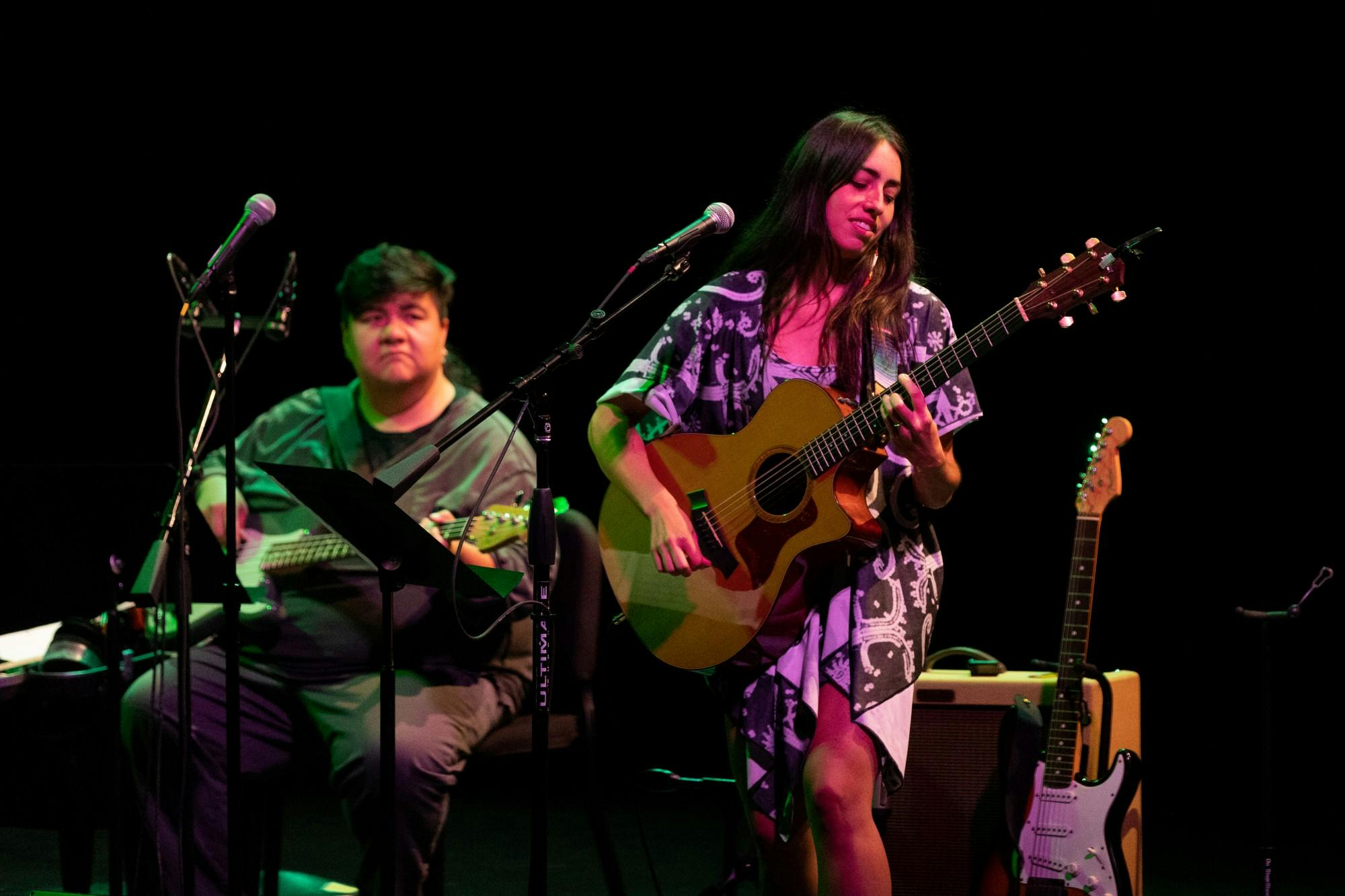This Friday, the Hopkins Center for the Arts will present “Welcome to Indian Country,” a collaborative performance of both song and stories. Co-commissioned by the Hop, the show features 10 songs performed by a group of six Indigenous artists.
The show’s artistic director Andre Bouchard, who is of Kootenai and Ojibwe descent, described the performance as a celebration of Indigenous culture and resilience to pandemic diseases throughout history.
“Welcome to Indian Country” is at its heart a celebration of the joy that I feel — and that the cast members feel — being part of Native communities, being part of Native culture,” he said. “I felt as though the world needed a celebration. Coming from communities and tribes that have been profoundly impacted, perhaps more profoundly impacted, by pandemics in the last 200 years, we have a unique perspective on the resilience responding to this.”
Co-musical director Julia Keefe, who is a member of the Nez Perce tribe, said she appreciates the show’s celebratory nature.
“So often you hear about the trials and the heaviness, the historical trauma and generational trauma,” she said. “Those are very real, of course, and it’s not that this show neglects it or ignores it or pretends that it is not there. There’s very much that acknowledgement, but with these musicians there’s also this celebration of who we are, and the resilience of Indigenous people and people of color.”
Bouchard emphasized the Hop’s important role in promoting the Indigenous performing arts.
“Dartmouth has perhaps one of the greatest commitments to Native American arts,” he said. “The Hopkins Center has made perhaps the greatest commitment that I know of any performing venue in the country to fostering Native American performing arts.”
Devan Meakala Wilhelm ’25 has attended Indigenous performances at the Hop in the past, and said she is looking forward to being at Friday’s show as well.
“I went to a jazz concert and they had a Native American singer,” she said. “She was singing songs that talked about Indigenous identity and pride and everything, and that really inspired me. I think this concert is the same way, where it promotes Indigenous identity and it’s a way of renaissance and Native resiliency through music.”
Wilhelm, who is Native Hawaiian, said she is excited to listen to music that reminds her of home.
“A lot of Hawaiian songs that I’ve learned in school or with my family have been about Hawaiian renaissance and cultural perpetuation,” she said.
Lhaq’temish (Lummi) Nation member and Washington state poet laureate Rena Priest, who curated the show’s song selection, said that the musical performances will be accompanied by an explanation of each song’s meaning.
“I tell the stories of the different songs that are performed and give the audience a little bit more information than would be available without me being there,” Priest said.
Her contributions include her original poetry work, along with prose created to tell the stories behind the music.
“I got to interview each of the musicians about the piece that they contributed and learn all about what their process was, either finding it or putting it together and arranging it,” Priest said. “That is a lot of what the show is composed of, the stories of each song.”
While the individual artists each brought their own songs to the show — either ones they wrote or ones they found and arranged — the production’s design is a collaborative effort. The collaboration first began over Zoom in March 2020, when the artists discussed their initial vision for the production. Then, “Welcome to Indian Country” moved into residency, which is when the artists began collaborating in the theater. They began their residency at the Washington Center for the Performing Arts in Olympia, Washington, Bouchard’s hometown venue.
Keefe described the fun, experimental nature of the collaboration.
“The whole creative process has been really inspiring,” she said. “When we all got together for our first residency in Olympia, it was amazing how quickly we were able to come together and make this music resonate.”
The artists all collaborated on the opening piece, an interpretation of a traditional creek fiddle dance. Artist Nokosee Fields, part of the Osage, Creek and Cherokee tribes, brought in a decades-old field recording of one of these dances, and the artists worked together to turn the recording into a full musical number.
“To have this field recording — which is also incorporated into the performance that we do — but then to take that concept and expand upon it, it was just so fun for all of us,” Keefe said.
Bouchard recognized the fun the artists had while designing the show, but also emphasized the impact the performance can have on its audience.
“As celebrations go, it might feel really low key, but there’s an underlying tone of happiness, of joy, of sharing, of community because wherever we bring this, we make a community in that room,” he said. “There’s a mutual sort of investment in the now every time you get people on stage. For the night, you are our community.”
The performance will take place in Spaulding Auditorium at 7:30 p.m. this Friday.





